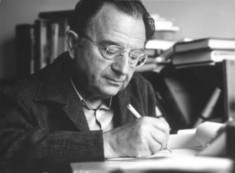| Erich Fromm | |
|---|---|
 |
|
| Philosopher | |
| Specialty | Frankfurt critical theory |
| Born | Mar. 23, 1900 Frankfurt am Main, Germany |
| Died | Mar. 18, 1980 (at age 79) Muralto, Ticino, Switzerland |
| Nationality | German |
Erich Fromm was a popular German psychoanalyst, social psychologist, sociologist, democratic socialist and a humanistic philosopher. He was closely associated with what is now known as Frankfurt School of critical theory.
Fromm’s Early Life
Erich was born on March 23, 1900, in Frankfurt. He was the only child of Orthodox Jewish parents. In 1918, he started his upper academic studies. He started with two semesters of jurisprudence at the University of Frankfurt. In 1919, during the summer semester, Erich studied as University of Heidelberg.
He started learning sociology with the aid of Alfred Weber, K. Jaspers, and Heinrich Rickert. In the year 1922, he received his own PhD from Heidelberg. After this, he trained to be a psychoanalyst in Heidelberg. He started his own research institute in 1930 and later completed his psychoanalytical studies.
Career Highlights
In 1934, the Nazis took over power in Germany and so Erich Fromm moved all the way to Geneva before going to join Columbia University located in New York. He left Columbia after a short while and then helped in the formation of the New York branch of Washington school of Psychiatry in 1943. Between 1941 and 1949, he was on the faculty of Bennington College.
In 1949, Fromm went to Mexico City where he joined the UNAM as a professor and even came up with psychoanalytic section at medical school in the university. He also taught psychology at the Michigan State University between 1957 and 1961. He later taught at New’ York University after 1962. Erich continued to teach at the UNAM until he retired in 1965. In 1974, he left Mexico City for Muralto in Switzerland.
Contributions to Psychology and Philosophy
 Erich Fromm’s first major work – Escape from Freedom – was published in 1941. His writings were notable for their political and social commentary along with their philosophical and psychological underpinnings. His first book is viewed as one amongst the founding works of Political psychology. His second book, Man for Himself, was first published in 1947. It was simply a continuation of his ideas of his first book. Basically, the two books talked about the human nature.
Erich Fromm’s first major work – Escape from Freedom – was published in 1941. His writings were notable for their political and social commentary along with their philosophical and psychological underpinnings. His first book is viewed as one amongst the founding works of Political psychology. His second book, Man for Himself, was first published in 1947. It was simply a continuation of his ideas of his first book. Basically, the two books talked about the human nature.
His most popular work was called The Art of Loving. This was an international bestseller that was first published in 1956. The book outlined theoretical principles of the human nature that was found in his first two books. These principles were actually revisited in most of his other major works.
While studying for his doctorate at the University of Heidelberg, Fromm studied the Tanya, which is a Jewish code from the 16th century, by the founder of Chabad. He also studied under Nehemia Nobel while still studying in Frankfurt. The cornerstone of Erich’s humanist philosophy is an interpretation of the famous biblical story of the first people on the Garden of Eden, Adam and Eve.
He stated that being in a position to distinguish between good and evil is simply considered a virtue. He extolled the different virtues of humans by taking several independent actions and then using reason to create moral values instead of adhering to the authoritarian moral values.
Erich believed freedom was a great aspect of the human nature that can either be embraced or escaped from. He observed that when we embrace freedom of will, then this is healthy. However, if we escape freedom through the escape mechanisms, then conflicts would arise, according to Fromm.
Fromm’s Six Orientations of Character
In the book Man for Himself, Erich Fromm talked about the orientation of character. He outlined how an individual related to the world through acquiring and assimilating things and through socialization. He asserted that these two character systems represented the way a man responds to conflicts in his life. These two kinds of orientation form five types of malignant character called Receptive, Hoarding, Exploitative, Marketing and Necrophilous, with only one positive character called Productive.
Political Ideas and Legacy
Eric Fromm is best known for his book Escape from Freedom in which he focused on the human need to seek a good source of authority and control upon attaining freedom, which he believed to a person’s true desire. In the book, he found favor with lack of rigid structure, individual freedom, and obligations that the members of medieval society were required to do.
In the early 1960s, Erich Fromm published two books that dealt with Marxist thought. They were Marx’s Concept of Man and Beyond the Chains of Illusion: My Encounter with Marx and Freud. In 1965, he published a number of articles called Socialist Humanism. A year later, in 1966, he was named Humanist of the Year by the American Humanist Association.
For a while, he was active in U.S. politics. He even joined the Socialist Party of America. In 1980, he died at his home a few days before his 80th birthday.